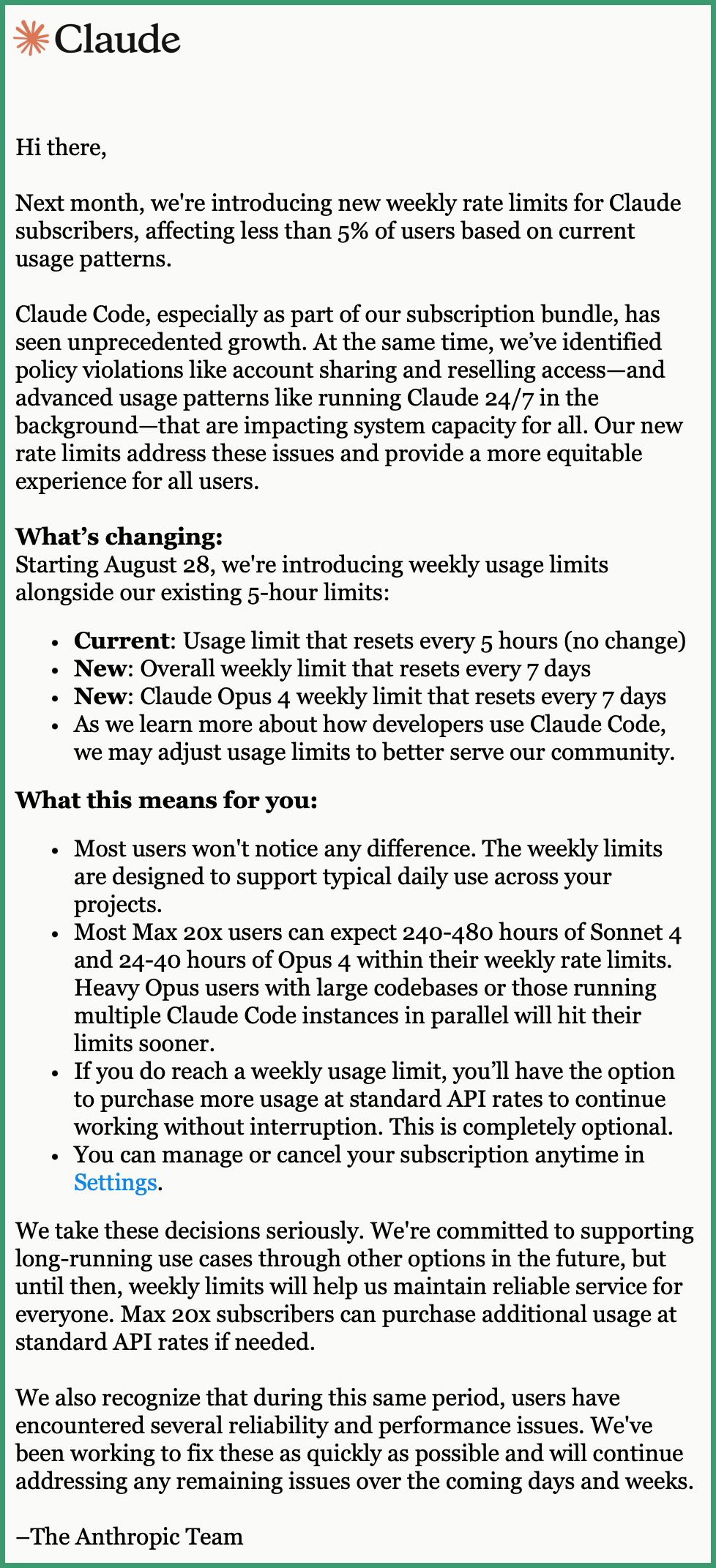💡 TL;DR - The 30 Seconds Version
👉 Anthropic introduces weekly rate limits for Claude Code starting August 28, affecting less than 5% of current users.
📊 Max subscribers can't see their usage data, while API customers get full dashboards and real-time tracking.
🏭 Heavy users will hit invisible walls with no warning, then pay API rates to continue working.
🌍 This creates information asymmetry where only Anthropic knows who's approaching limits and when.
⚖️ The move contradicts Anthropic's ethical positioning and constitutional principles for AI transparency.
🚀 Chinese competitors offering similar tools with better transparency could win over frustrated developers.
When an AI Company Obscures Usage Data, Users Lose and So Does Trust
Anthropic wants to cap how much Max subscribers can use Claude Code. Fair enough. Their servers, their rules. When 5% of users burn through resources like digital locusts, limits are justified.
But let’s be clear about what’s really happening: Anthropic is hiding the meter while tightening the tap.
Starting August 28, new weekly rate limits roll out. Most users won’t notice, they say. Heavy users will. If you need more, pay API prices. Textbook strategy—until you realize Max subscribers can’t see their usage at all.
No dashboard. No alerts. No quota countdown. Just a vague line in the FAQ and a hard stop when you unknowingly cross an invisible line.

It’s like driving a rental car where only the company knows how much fuel is left—until you stall in the middle of nowhere.
The Asymmetry at the Core
This is textbook information asymmetry. Anthropic knows exactly how much each user consumes. Users know nothing. That imbalance gives Anthropic enormous power—to limit, penalize, or push upgrades—without user foresight or recourse.
It’s not just inconvenient. It’s manipulative.
Imagine budgeting a coding sprint, deploying a project, or onboarding a team—without knowing when your tools might cut out. When your workflow relies on Claude Code, guesswork becomes risk.
And the irony? This comes from a company that markets itself as the ethical AI lab. One that wrote a constitution for its AI. One whose CEO, Dario Amodei, once rejected Saudi funding on ethical grounds.
Yet just weeks ago, Amodei privately told employees the company will now pursue investments from UAE and Qatar—reversing that stance. In an internal memo, he admitted the move could enrich “dictators” but said it was necessary to remain competitive. “If we want to stay on the frontier,” he wrote, “we gain a very large benefit from having access to this capital.”
So much for AI with a conscience.
Anthropic says these will be “narrowly scoped” financial deals—no operational control, no data centers abroad. But for users and developers, the optics are the same: the company that once warned of authoritarian influence is now taking the money and hoping no one asks too many questions.
Ethics Shouldn’t Stop at the API
There’s a revealing contrast. API users—who pay per token—get real-time usage data. Dashboards. Logs. Predictability.
Max subscribers—who pay a fixed monthly rate—get a black box. No metrics, no levers, no visibility. It’s a system that rewards transactional customers while punishing loyal ones.
That’s not just backward. It’s cynical.
And it’s coming at the worst possible time. Claude Code has already faced criticism for instability, degraded performance, and opaque messaging around updates. Now users get throttling with no warning and no insight.
Competitors Are Watching—and Learning
Meanwhile, Chinese startups are rolling out Claude-style agents at a fraction of the cost. With more transparency. With faster iteration. With fewer PR theatrics.
These companies understand what Anthropic seems to have forgotten: transparency isn’t a marketing slogan. It’s a moat.
When developers can get 80% of Claude’s power at 50% of the price—and actually track what they’re using—the switch is inevitable. Loyalty evaporates when trust does.
This Isn’t About Limits. It’s About How You Treat People.
Every service needs guardrails. But how you enforce them matters.
Anthropic could have built dashboards. It could have sent warnings. It could have published clear thresholds. Instead, it built a wall—and told users to guess where it starts.
And that choice says everything.
It tells us who Anthropic sees as partners (API clients), who it sees as problems (power users), and what it’s willing to sacrifice (transparency) to manage demand.
It tells us that even the most high-minded AI company can fall into an old corporate trap: believing that “fairness” means you’re fair, and “trust” means they trust you.
But users remember. Developers talk. And competitive markets don’t forgive opacity for long.
Why This Matters:
• When AI companies preach ethics but practice opacity, they corrode trust not just in themselves, but in the entire AI ecosystem.
• Rate limits aren’t the issue. Secrecy is.
• Competitors with better pricing and better transparency will win over developers—especially those building serious tools on top of AI infrastructure.
If Anthropic wants to be the responsible AI company, it needs to start with something simple: show users the meter.
❓ Frequently Asked Questions
Q: What exactly are the new weekly limits for Max subscribers?
A: Max 20x users get 240-480 hours of Claude Sonnet 4 and 24-40 hours of Claude Opus 4 per week. The limits reset every 7 days. Heavy Opus users with large codebases or multiple instances will hit limits faster.
Q: How much do you pay for extra usage after hitting limits?
A: You pay "standard API rates" but Anthropic doesn't specify exact prices in the email. API pricing typically charges per token used, which can vary significantly based on the complexity and length of your requests.
Q: Why can't Anthropic just add a usage dashboard like other services?
A: Technical capability isn't the issue—API customers already get detailed usage tracking. The company hasn't explained why Max subscribers can't access the same data, creating an intentional information gap.
Q: What exactly is Claude Code and why is it so popular?
A: Claude Code is an AI coding assistant that can run continuously in your development environment. It helps write, debug, and explain code. Its popularity comes from being able to handle complex, multi-file projects better than most competitors.
Q: What reliability issues have Max subscribers been experiencing?
A: Anthropic mentions "several reliability and performance issues" but doesn't specify details. Users have reported slower response times, service outages, and degraded performance during peak hours over recent weeks.
Q: Which Chinese companies are building similar tools at lower prices?
A: The article references Chinese startups generally but doesn't name specific companies. Several Chinese AI firms like DeepSeek, Baichuan, and others offer coding assistants at significantly lower costs than Western alternatives.
Q: How much does a Max subscription cost compared to API usage?
A: Anthropic's Max plans start around $20-200 per month for unlimited usage within limits. API pricing varies by model and usage but can cost significantly more for heavy users, which is why the fixed-rate Max plans were attractive.
Q: What does Anthropic's "constitution" have to do with transparency?
A: Anthropic created a set of principles for training AI systems to be helpful, harmless, and honest. The irony is they champion transparency in AI behavior while keeping their own user data practices opaque.











